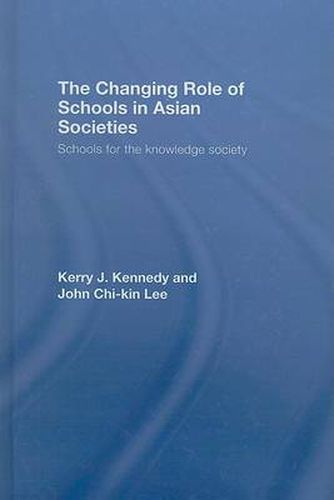Readings Newsletter
Become a Readings Member to make your shopping experience even easier.
Sign in or sign up for free!
You’re not far away from qualifying for FREE standard shipping within Australia
You’ve qualified for FREE standard shipping within Australia
The cart is loading…






Walk into a classroom in Tokyo, New York, London or Rotterdam, and the similarities in structure, activity, purpose and style will outweigh differences in language, dress and ethnic characteristics. Learning is regulated and rationed, teaching is a process or one-way transmission of knowledge, students need to be docile and conformist, assessment needs to sift and sort the bright from the not-so-bright, and rewards will be given to those who successfully negotiate this regime. But are these the kinds of places that can meet the needs of the ‘net generation’?
The Changing Role of Schools in Asian Societies
is concerned with the debate about the nature of modern schooling in Asia. Traditionally schools are historical constructions reflecting the social, economic and political needs of the societies that invest in them. As Asia faces the challenges posed by the ‘knowledge economy’, its schools have taken on a new and quite different importance. This informative book outlines the broad policy contexts in which these transformations are taking place and the practical strategies that are needed to meet this objective.The authors argue that the future of Asian societies depends on a transformation that requires a fundamental restructuring of schools as we know them while maintaining their long-held cultural values. This valuable insight:
provides an overview of educational issues in Asian societies
establishes a broad theoretical framework in which these issues can be understood
contextualizes issues by providing country case studies
acknowledges the important role of culture influencing educational priorities.
It should be of interest to all those working in education policy and comparative education.
$9.00 standard shipping within Australia
FREE standard shipping within Australia for orders over $100.00
Express & International shipping calculated at checkout
Walk into a classroom in Tokyo, New York, London or Rotterdam, and the similarities in structure, activity, purpose and style will outweigh differences in language, dress and ethnic characteristics. Learning is regulated and rationed, teaching is a process or one-way transmission of knowledge, students need to be docile and conformist, assessment needs to sift and sort the bright from the not-so-bright, and rewards will be given to those who successfully negotiate this regime. But are these the kinds of places that can meet the needs of the ‘net generation’?
The Changing Role of Schools in Asian Societies
is concerned with the debate about the nature of modern schooling in Asia. Traditionally schools are historical constructions reflecting the social, economic and political needs of the societies that invest in them. As Asia faces the challenges posed by the ‘knowledge economy’, its schools have taken on a new and quite different importance. This informative book outlines the broad policy contexts in which these transformations are taking place and the practical strategies that are needed to meet this objective.The authors argue that the future of Asian societies depends on a transformation that requires a fundamental restructuring of schools as we know them while maintaining their long-held cultural values. This valuable insight:
provides an overview of educational issues in Asian societies
establishes a broad theoretical framework in which these issues can be understood
contextualizes issues by providing country case studies
acknowledges the important role of culture influencing educational priorities.
It should be of interest to all those working in education policy and comparative education.